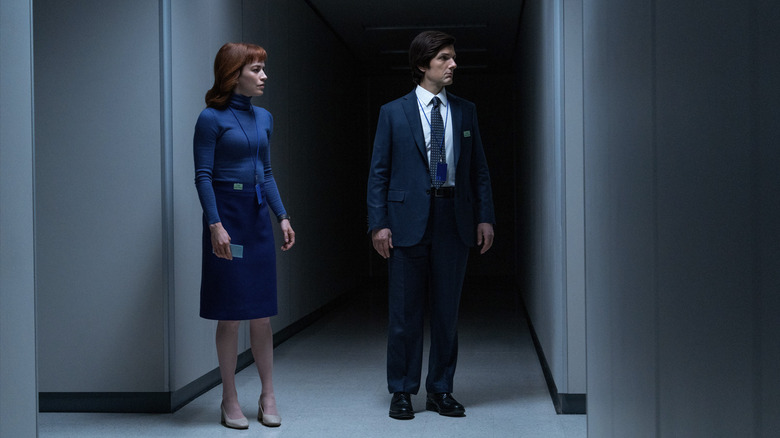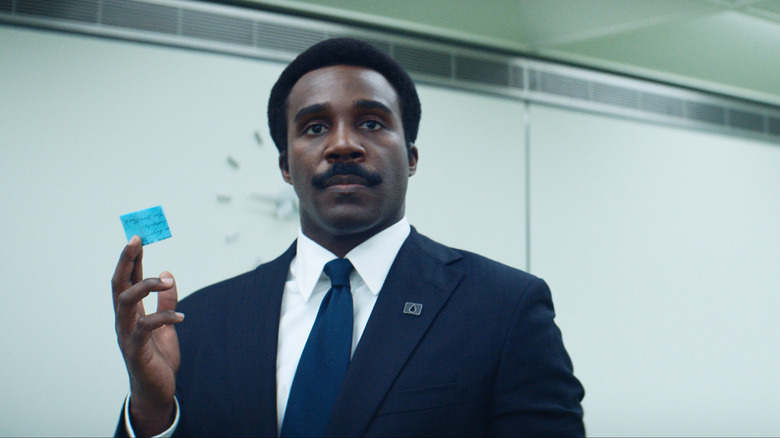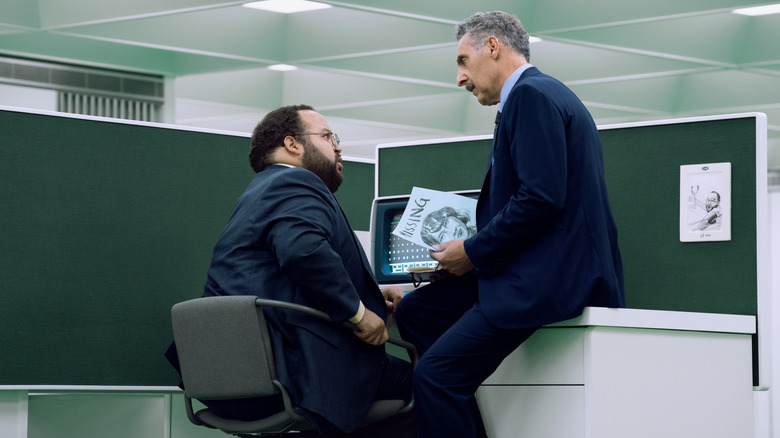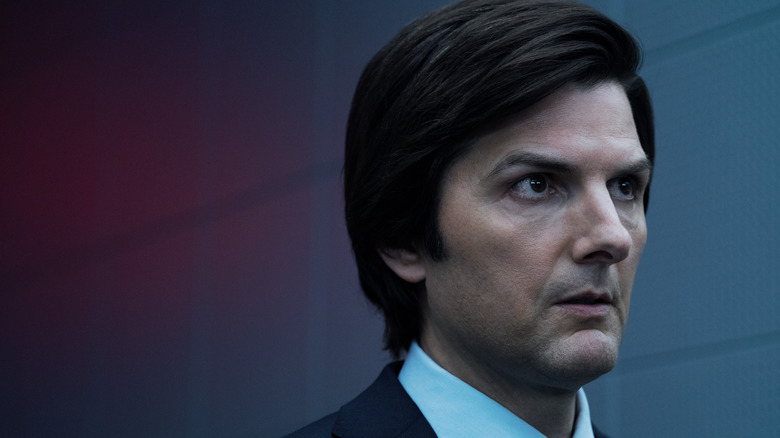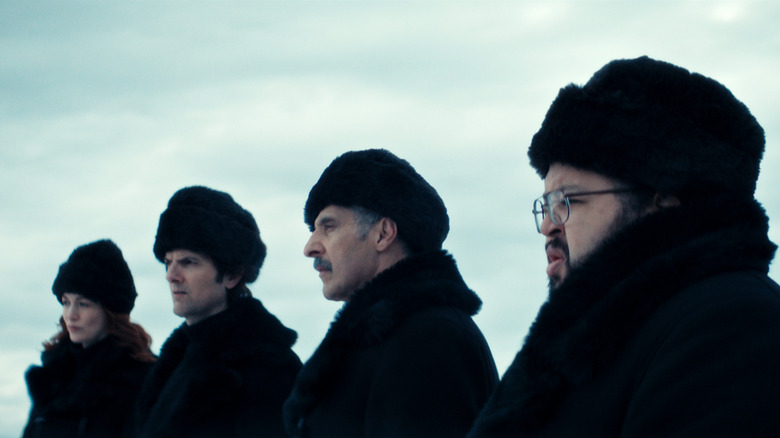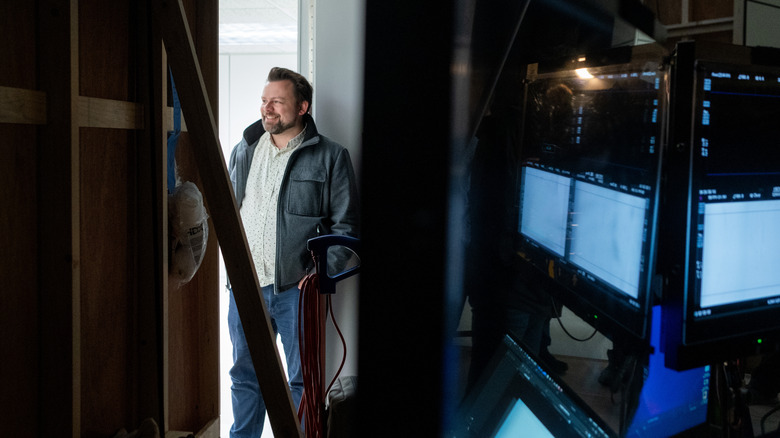Severance Showrunner Reveals Ben Stiller's Reaction To The Show's Planned Ending [Exclusive Interview]
This post contains spoilers for "Severance" season 2, episode 1, "Hello, Ms. Cobel."
After delivering one of the best season finales of all time, "Severance" is finally back. A pair of industry-shaking strikes likely contributed to a nearly three-year delay between seasons, but I found the acclaimed Apple TV+ science fiction series as intriguing as ever in its season 2 premiere. Showrunner and creator Dan Erickson, director and executive producer Ben Stiller, and the rest of the show's creative team take their time depicting some of the consequences of that incredibly tense finale episode, and even toy with the audience by giving us a little fake-out scenario featuring a whole new team for Mark S. (Adam Scott) to deal with in the Microdata Refinement department of Lumon Industries. But about halfway through the episode, Mark reunites with his co-workers from the first season – Helly R. (Britt Lower), Dylan G. (Zach Cherry), and Irving B. (John Turturro) — and the core team begins to formulate a plan for how to move forward.
Ahead of the season premiere, I had the opportunity to speak with Erickson about the reason for that fake-out, whether the reception to season 1 impacted the writing of season 2, expanding the scope of the story, how his dynamic with Ben Stiller has evolved over these two seasons, his plan for ending the series (plus Stiller's reaction to his idea for the final scene), and much more.
Note: This interview has been lightly edited for clarity and brevity.
The Severance writers listened to fan feedback, but weren't beholden to it
I want to ask a timing question to start things off. Did you begin writing season 2 after the first season came out?
No, no. We were working on it while we were actually still in production for season 1. So there was a period where I was on set, I would be there for rehearsal, and then I would go and I would join the writers' room via Zoom, and that was a little bit of a crazy time.
Interesting. I was wondering if the "you're all famous!" bit where Milchick shows Mark the newspaper article was a meta nod to the success of the first season, but it sounds like that wasn't the case.
A little bit. Well, I will say we started writing, but a lot of the scripts were not finalized until after we had wrapped production, and in fact, until the show had come out. So that, actually, there was kind of a fun meta element to that line.
Were you able to change anything or course correct based on the response to season 1? Or were you really trying not to pay attention to any of the outside reaction?
We didn't want to be too beholden to it because I think that way lies madness. But at the same time, I think it was sort of a gift to be able to hear people's reaction, find out what people were falling in love with, and there's a version where nobody cared about the goats and we maybe didn't feel like it was as necessary to follow up on that. But in fact, people care very much about the goats. [laughs] So it's a mix: You want to listen to some of it, but you don't want that to be the main thing guiding what you do.
100%.
Balancing the tone of Severance is one of the toughest parts of making it
So "Severance" is your first big show, and I'm wondering what you learned from season 1 that you were able to apply to season 2?
Yeah, I mean, I had worked on the "Lip Sync Battle" YouTube preshow prior to "Severance," and that was my main thing and I learned a lot from that, but I will say I learned more on season 1. I think trying to find just the balance of the role that humor plays on the show — because I've said this about the show before, that it's a comedy in the foreground and it's a thriller in the background, where a lot of the scary stuff is building up on the periphery as we are arguing about pencil erasers and group photos — that was something that I didn't even fully understand when we were writing the first season.
But that balance became very apparent once it came out and I was able to watch it and I sort of pointed at that as something that we need to try to replicate. So yeah, just literally learning what the tone of the show is, because in a way you don't get it until everybody on the creative team has been able to put their stamp on it and then all of a sudden you're watching the show and you go, "Oh, that's what it is. I didn't know."
When you were in post on season 2, were you able to put together cuts of these episodes and then say, "You know what, we actually need more here," and did you have time for reshoots and things like that? Were you able to sort of tweak things in that way?
There was a little bit of that. There weren't a lot of straight-up reshoots, but there were a couple of things where we realized we needed a little more connective tissue on something, either on a story level or a character level. Especially for the earlier episodes where we've still got all the sets up and everything. So we were able to go back and tweak a few of those things, but for the most part, once the cuts came in, we were like, "These are pretty good!"
There are no conventional villains in Severance
So I want to talk a little bit more about that first episode. It's not until about 20 minutes in that Mark reunites with his co-workers from the first season. I was wondering if you could tell me about why you wanted to structure the episode in a way that kind of has the audience on its heels immediately and then settles us in a little bit more in the back half.
Yeah, I mean, on just a kind of a fun mischievous level, we wanted people to wonder, "Oh God, is this the new cast of the show? Is this going to be a show about these characters?" And we wanted to create characters where, on a level, you would be okay with that, because these are really fun [actors]. It's Bob Balaban and Alia [Shawkat] and Stefano [Carannante], and they all play so well off each other and they're foils for Mark in a way that we haven't seen before.
But at the same time, I remember the day that we shot the scene where Helly and Irving and Dylan come back and I remember getting a little teary, because it was like, you find that you've been wanting that. You find that you've been craving that team. As wonderful as these other characters are, we want our core four back together because we've invested so much in them and we love them. So we wanted it to be a little bit of a misdirect, but then ultimately bringing us back to the team that we've come to know and love.
From a big picture perspective, how do you approach keeping the audience invested in the corporate machinations of Lumon? Because we relate so strongly to Mark and Helly and Dylan and Irving that I imagine as a writer, it might be a little difficult to switch perspectives to the Lumon side of things. Do you have an approach for how you handle that?
Yeah, we see a lot more privileged scenes with just the management team this time around, and we see scenes with characters who are — where before we only saw the results of their actions, and now we're following them a little bit more as characters. And that's harder because you never want those characters to feel like these kind of soulless arch villains. At the same time, you don't want to let them off the hook. So this season, we try to get into a lot more to what makes Seth Milchick tick, what makes Harmony Cobel tick, what makes Helena Eagan tick? Because at the end of the day, nobody is evil for the sake of being evil. Everybody thinks they either are following some personal need or they're doing something that they think at the end of the day is the right thing to do. So it was really interesting to get into those questions for these characters that maybe before have mostly just been presented as foils for our protagonists.
Dan Erickson knows how Severance will end
Do you have an idea in your head of how this show will end?
I do. I have a scene in mind that's kind of mostly been unchanged since I first brought the show to Ben [Stiller] and I told him and he was like, "Ooh, that's pretty good." A lot has changed about the plan. I won't pretend that it's been this structurally perfect thing from day one. We've interrogated it and we've updated it as we've gone along, but the skeleton of it and the end point, that's sort of remained our North Star from the beginning.
How specific is your vision for the end? Do you know where each character ends up, do you just have kind of a broad idea of what will happen, or do you just have the single last moments in your mind? Because TV is such a fun medium in that it's so fluid and there's obviously the stories about Jesse Pinkman on "Breaking Bad," that character popping in such a big and unexpected way, and the whole show is totally different because of that. So obviously you leave yourself room to change things on the fly, but how specific is your vision of how you want this to wrap up?
Yeah, you can definitely under-plan a show like this, but you can also over-plan it. And if you're too rigidly stuck to your original conception of it, then you can really impede your progress. I mean, my original version of the script was very different, and before I brought it to Ben, there was a version that was much more heightened. It was closer to something like "Brazil" or almost like a Monty Python thing where it was dark, but then there was this almost magical realism. And had I been obsessively married to that, we never would've gotten the show that we got.
So you have to sort of take that lesson and use that moving forward and remember that there may be a better version of this that you don't know yet and you have to be open to that. And you have to let yourself fall in love with certain characters or other elements of the story that you didn't expect to, and be able to think on your feet and weave them into the narrative and be like, "Okay, I didn't expect to love this guy, but now we can't make the show without him. So what's his role in the rest of this thing?"
So with all of that said — and this is the last question I'll ask you about the ending — how many seasons do you think make sense for "Severance" as a whole?
We have a number in mind. I think that's all I can say.
Okay, fair enough.
We have a pretty good number in mind that — we're not positive. It's like, "Maybe we'll do more, but probably it's going to be this number."
Gotcha. Okay. So tell me about working with Keanu Reeves on the "Lumon is Listening" video in the season 2 premiere. I'm pretty sure it was Keanu. He's not credited in that first episode, but it sure sounded a lot like him.
[slyly] Well, I certainly have no idea what you could be talking about. I'm not actually familiar with that actor.
I see.
Is that the guy from "The Lake House?"
[laughs] It is, in fact.
I do love "The Lake House."
Okay, so that line of questioning is clearly going nowhere. [laughs]
The Severance characters will experience the 'dire consequences' of season 1's finale
Tell me about working with Ben Stiller, the relationship and the dynamic you two have. How has that evolved from season 1 to season 2?
Yeah, I think that we've sort of solidified the way that we communicate with each other. Ben has always been a really generous collaborator and he has so much energy and puts so much of his time and effort into the show, which ... he's Ben Stiller. He doesn't have to that. But he does. And I've always felt like I have to up my game to match what he's doing. But I was coming into this having no experience and working with somebody with decades of experience, so I had to kind of learn how to approach that. By this time, we've been doing this long enough that we really, I think we each have a lot of respect for each other's role and each other's judgment. And sometimes we'll reach a point where we have different ideas for which way we want to go. But I think that we've gotten really good at sort of hearing each other and listening to each other and understanding that somewhere between us, there's that sweet spot and that it takes both of our input to really get there.
Yeah, definitely. So the last question I have for you: What, if anything, do you feel comfortable teasing about the rest of this season for our readers and listeners?
I think the MDR team got a big victory at the end of season 1, but at Lumon, there is no victory without pain and reprisal. And you punch Lumon in the nose, you're going to get punched back in your whole head. They're never going to be obvious or overt in the way that they hit back, but the punch is coming. So I think people should go in understanding that there's going to be some dire consequences for the heroes that we've come to love.
***
"Severance" season 2 premiered today, and new episodes will roll out weekly on Apple TV+. You can read our review of "Severance" season 1 here.
